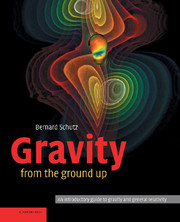Book contents
- Frontmatter
- Contents
- Preface
- Background: what you need to know before you start
- 1 Gravity on Earth:
- 2 And then came Newton
- 3 Satellites
- 4 The Solar System
- 5 Tides and tidal forces
- 6 Interplanetary travel
- 7 Atmospheres
- 8 Gravity in the Sun
- 9 Reaching for the stars
- 10 The colors of stars
- 11 Stars at work
- 12 Birth to death
- 13 Binary stars
- 14 Galaxies
- 15 Physics at speed
- 16 Relating to Einstein
- 17 Spacetime geometry
- 18 Einstein's gravity
- 19 Einstein's recipe
- 20 Neutron stars
- 21 Black holes
- 22 Gravitational waves
- 23 Gravitational lenses
- 24 Cosmology
- 25 The Big Bang
- 26 Einstein's Universe
- 27 Ask the Universe
- Appendix: values of useful constants
- Glossary
- Index
2 - And then came Newton
Gravity takes center stage
Published online by Cambridge University Press: 05 June 2012
- Frontmatter
- Contents
- Preface
- Background: what you need to know before you start
- 1 Gravity on Earth:
- 2 And then came Newton
- 3 Satellites
- 4 The Solar System
- 5 Tides and tidal forces
- 6 Interplanetary travel
- 7 Atmospheres
- 8 Gravity in the Sun
- 9 Reaching for the stars
- 10 The colors of stars
- 11 Stars at work
- 12 Birth to death
- 13 Binary stars
- 14 Galaxies
- 15 Physics at speed
- 16 Relating to Einstein
- 17 Spacetime geometry
- 18 Einstein's gravity
- 19 Einstein's recipe
- 20 Neutron stars
- 21 Black holes
- 22 Gravitational waves
- 23 Gravitational lenses
- 24 Cosmology
- 25 The Big Bang
- 26 Einstein's Universe
- 27 Ask the Universe
- Appendix: values of useful constants
- Glossary
- Index
Summary
Born in the same year, 1642, as Galileo died, Isaac Newton revolutionized the study of what we now call physics. Part of his importance comes from the wide range of subjects in which he made fundamental advances – mechanics (the study of motion), optics, astronomy, mathematics (he invented calculus), … – and part from his ability to put physical laws into mathematical form and, if necessary, to invent the mathematics he required. Although other brilliant thinkers made key contributions in his day – most notably the German scientist Gottfried Leibniz (1646–1716), who independently invented calculus – no physicist living between Galileo and Einstein rivals Newton's impact on the study of the natural world.
In this chapter: we learn about Newton's postulate, that a single law of gravity, in which all bodies attract all others, could explain all the planetary motions known in Newton's day. We also learn about Newton's systematic explanation of the relationship between force and motion. When we couple this with Galileo's equivalence principle, we learn how gravity makes time slow down.
Nevertheless, it is hard to imagine that Newton could have made such progress in the study of motion and gravity if he had not had Galileo before him. Newton proposed three fundamental laws of motion. The first two are developed from ideas of Galileo that we have already looked at:
The first law is that, once a body is set in motion, it will remain moving at constant speed in a straight line unless a force acts on it. […]
- Type
- Chapter
- Information
- Gravity from the Ground UpAn Introductory Guide to Gravity and General Relativity, pp. 9 - 18Publisher: Cambridge University PressPrint publication year: 2003



